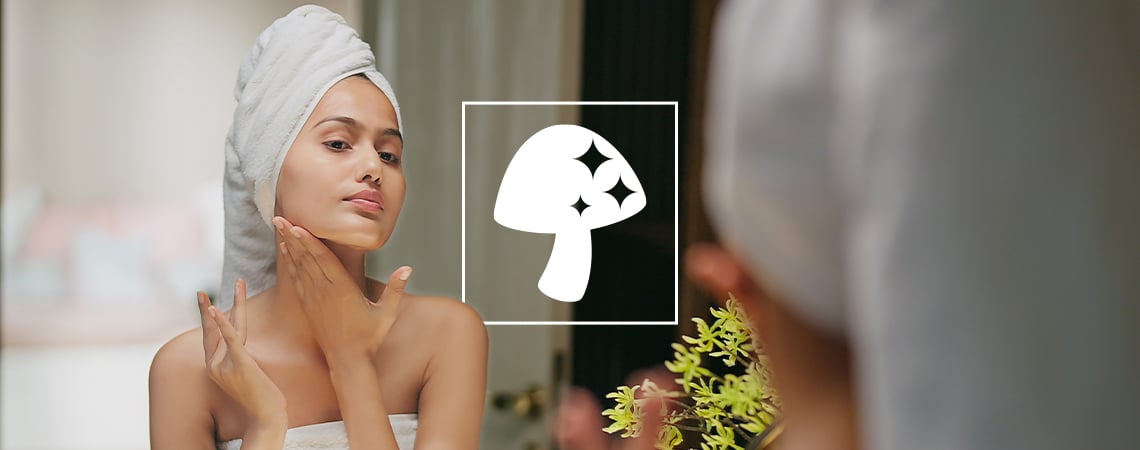
Everything You Should Know About Mushrooms In Skin Care
Though mushrooms are known to exhibit numerous health benefits, how do these life forms influence the skin when added to products like creams, serums, and balms? Let's take a look at the proposed effects of mushrooms on the skin, as well as which mushrooms are best for the job, and why!
Skin care is a multi-billion-dollar industry and it evolves rapidly, with some ingredients gaining popularity and others fading into the background. Promising to moisturise dry skin, restore glow, remove fine lines and imperfections, you name it—there's a product for you. And with the "shroom boom" reaching your favourite serums and creams, it's time to find out what your beloved mushrooms can do for your skin.
In this article, we explore why mushrooms are such a valued ingredient in skin care, which mushrooms are used in beauty products, and how you can add them to your daily regime.
Why are mushrooms used in skin care?
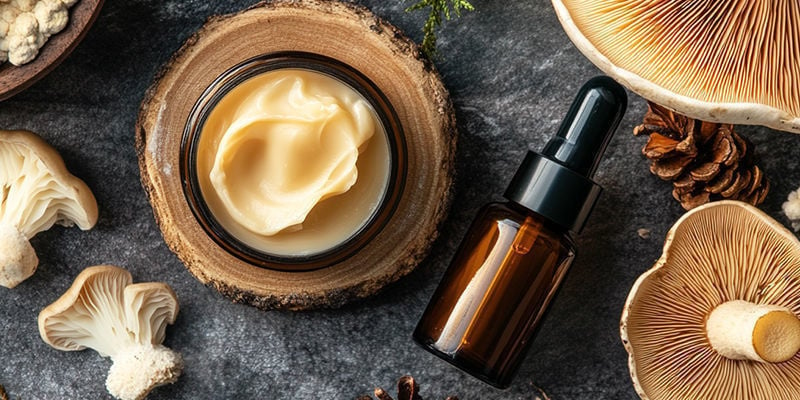
While interest in mushrooms in skin care has been steadily rising, mushrooms are definitely not new to our lives. They have been used for centuries in alternative holistic practices, and the beta-glucans, triterpenes, polysaccharides, and polyphenols found in mushrooms have the potential to influence the skin when used topically.
With that in mind, let's take a closer look at the potential benefits that mushrooms can have on the skin.
Influencing inflammation
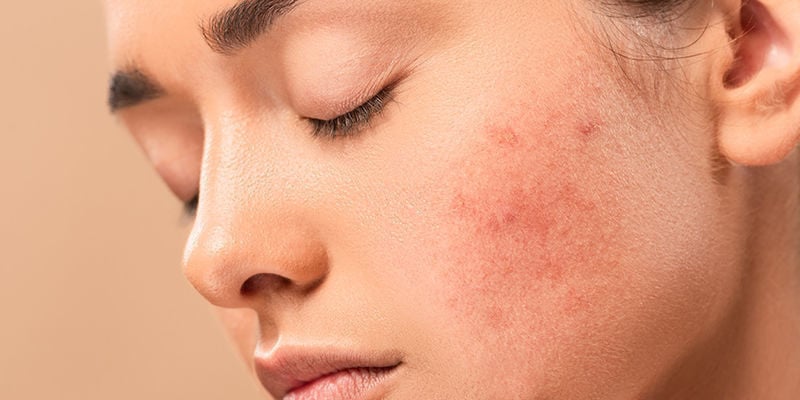
Not only a superfood that can boost your body's response to inflammation, the glutamine in certain mushrooms can have excellent results on sensitive skin. Whether it's dry skin, itchy patches, or even eczema and psoriasis, you might notice that products containing mushrooms help to regulate the inflammatory response and improve the look and feel of your skin.
Brightening properties
Shitake, reishi, and snow mushrooms are natural sources of kojic acid, which is believed to brighten the skin. By blocking and inactivating tyrosinase, the enzyme responsible for the formation of melanin, kojic acid can help to prevent discolouration on the skin, such as sun damage or hyperpigmentation. It's not an aggressive acid, though testing any new product on a small patch of skin first is always a good idea.
Minimising fine lines
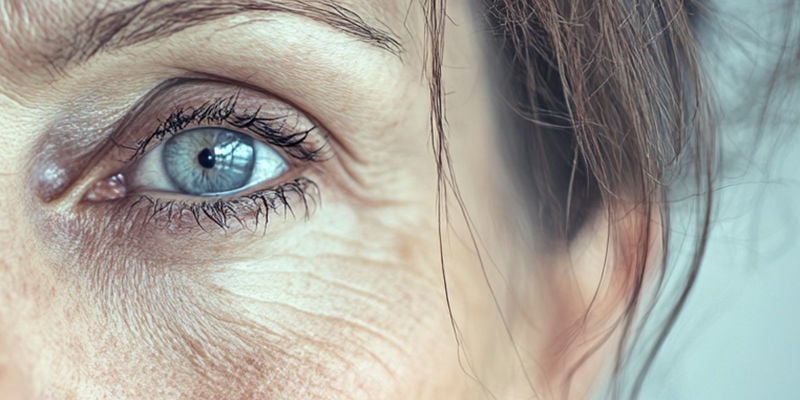
The antioxidant properties of glutamine protect the skin and help to prevent signs of ageing from appearing too fast. By keeping free radicals at bay, antioxidants help to curb cell damage while also promoting skin elasticity and firmness by stimulating collagen production. Overall, they help the skin appear younger and more vibrant.
Support general skin health
Rich in vitamins (mainly vitamins B6, C, and D) and antioxidants, mushrooms help to keep the immune system doing its job. When applied to skin, these compounds nourish skin cells and allow them to stay healthy. Skin loves vitamin C supplements, whether they're topical or working from the inside out—and there's no denying that healthy skin looks and feels amazing, so we rest our case!
What are the best mushrooms for skin care?
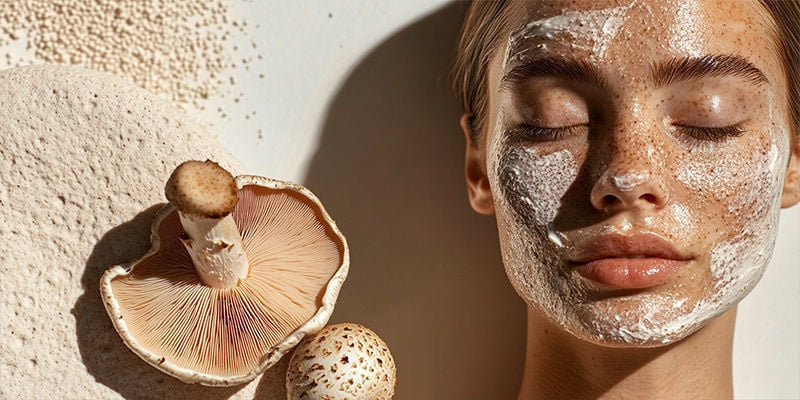
Now that you know what mushrooms can potentially do for your skin, we can dive deeper into some of the most sought-after mushrooms used in skin care, as well as their unique benefits. You will probably recognise some of the names below, and you might have even tried them as dietary supplements. So, what can they offer to dull, hyperpigmented, or sensitive, dry skin?
Chaga
Commonly found growing on trees in countries with cold climates, chaga is a rich source of antioxidants, minerals, and vitamins. The protective influence of certain triterpenoids found in chaga have been investigated, and the results are promising when it comes to their potential influence on inflammation and the signs of ageing (Park et al., 2023). Alongside other skin care ingredients, this mushroom could help improve the elasticity of the skin, as well as even out skin tone and help prevent hyperpigmentation.
Reishi
With its dark colour and bitter flavour, reishi is praised for its potential positive effects on the immune system and longevity. It's a firm favourite in East Asian culture where it has been used for centuries as a medicinal mushroom. Believed to help the skin look more radiant, the antioxidants abundant in the mushroom can also help to prevent damage to cells, improving their structure and resulting in more beautiful skin.
Shiitake
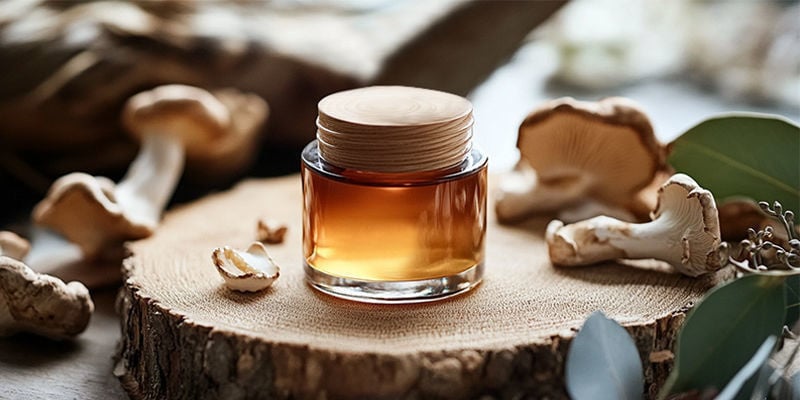
You likely associate this mushroom with the kitchen, but did you know it can also be added to your daily skin care routine? Packed with antioxidants and containing high doses of kojic acid, shiitake is a key player when it comes to brightening the skin. Besides potentially helping to fade sun spots and other forms of hyperpigmentation, the mushroom could also help protect the skin from cell damage and potentially slow down the appearance of the fine lines. Furthermore, its influence on the immune system helps to promote overall skin health and possibly reduce irritation.
Tremella
This white mushroom looks like coral growth on trees, and one of its most impressive traits is its high water content. Because it holds so much water, it's the perfect hydrating agent, often referred to as a natural substitute for the skin care staple, hyaluronic acid. Ideal for dry skin, tremella mushroom is also rich in uronic acid, which helps to increase the antioxidants responsible for protecting the skin from damage.
Cordyceps
Last but not least is cordyceps, which is also full of precious antioxidants. Skin protection and rejuvenation aside, this mushroom also promotes oxygen and nutrient flow in skin cells, helping it to appear healthy. Another benefit is the fact that cordyceps contains phytosterol components that can help to balance levels of testosterone and progesterone. This means that the mushroom can potentially help to prevent spots and other breakouts.
You will find the aforementioned mushrooms in a variety of skin care products, like lotions, serums, creams, and cleansers, sometimes accompanied by other, lesser-known mushrooms, such as trametes, agarikon, maitake mushrooms, or Albatrellus confluens.
Is mushroom skin care right for me?
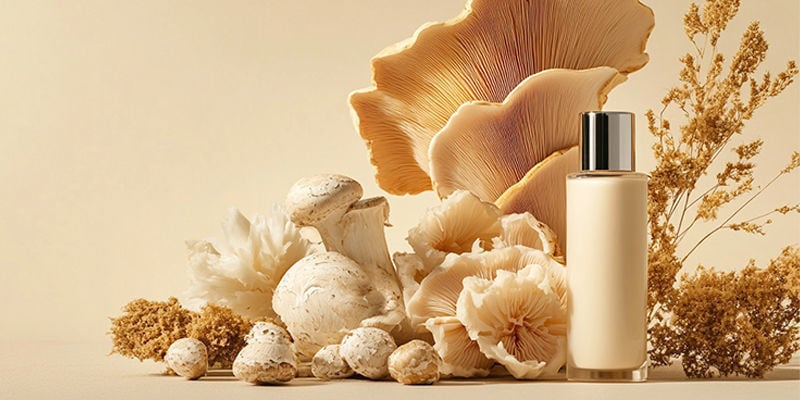
Many skin types could benefit from beauty products containing mushrooms, with those battling dry skin, hyperpigmentation, and flare-ups potentially noticing the most substantial effects. Of course, it’s always important to take any allergies into consideration, so if you've had any issues with mushrooms in the past, you should be cautious and either try the product on a small patch of skin first or stay away altogether.
In general, it's always advisable to test any new product on a small spot of skin, particularly if you have the tendency to experience rashes or other unpleasant reactions.
How to use mushrooms in skin care
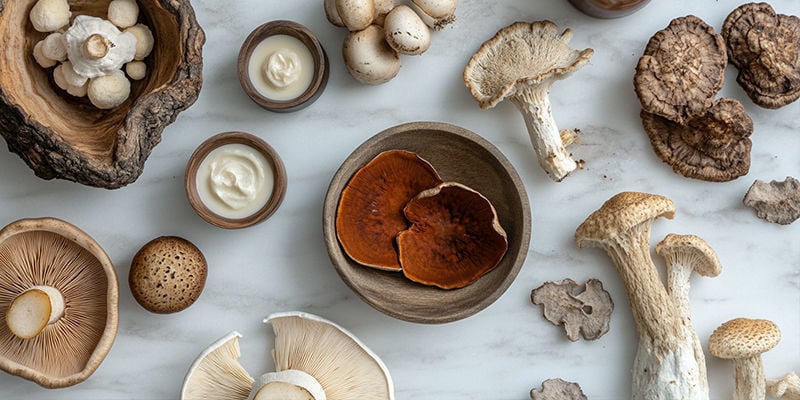
If you’ve decided that you want to try mushroom skin care products, there are a wide variety to choose from, including creams, lotions, cleansers, eye creams, serums, mists, and face masks—so you can add mushrooms to essentially every aspect of your skin care if you desire. Look for the ingredients you know your skin loves, as these will help to deliver the best results when combined with mushrooms.
What we don't recommend is experimenting with your own concoctions and adding mushrooms you picked yourself to your skin care products. Some mushrooms can be toxic or poisonous; plus, using the proper proportions is vital. It's best to leave this job to the professionals.
Healthshop
Our new Healthshop stocks a wide range of supplements and natural products to help you lead the healthy life you've always wanted.
Mushrooms and skin care: The takeaway
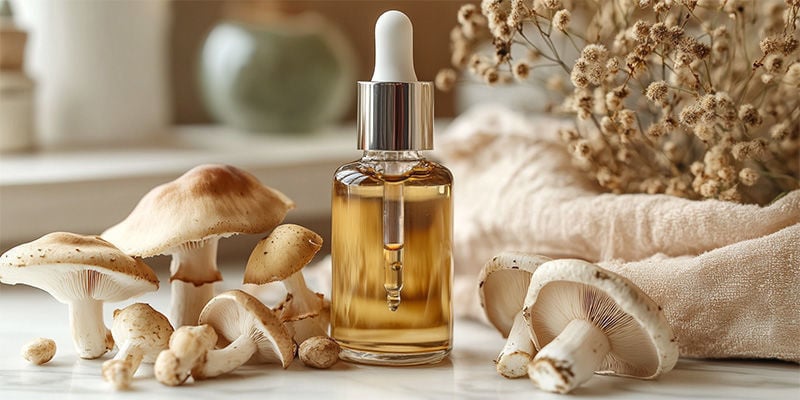
The benefits of mushrooms are widespread, and many of them may translate to the skin, making them an intriguing ingredient in skin care and beauty products. When you browse products online, it's plain to see that mushrooms are very much present in this industry. Join the "shroom boom" and see what benefits mushrooms can have on your skin. There's plenty to gain and, who knows, perhaps you'll find a new product that will become an essential part of your skin care routine going forward.
And remember, Zamnesia has you covered when it comes to sourcing all types of mushrooms. You'll even find mushroom powders on our website should you want to ingest your mushrooms instead of (or in addition to) applying them to your skin.
- Park, Jihyun, Nguyen, Thi Minh Nguyet, Park, Hyun-ah, Nguyen, My Tuyen Thi, Lee, Nan-young, Ban, So-young, Park, Kyu-been, Lee, Chang-kyu, Kim, Jaehan, Park, & Jong-Tae. (2023/1). Protective Effects of Lanostane Triterpenoids from Chaga Mushroom in Human Keratinocytes, HaCaT Cells, against Inflammatory and Oxidative Stresses - https://www.mdpi.com
-
 7 min
5 December 2024
Which Mushrooms Are Best To Eat?
Mushrooms are some of Earth's most compelling life forms. In this article, we're focusing on 11 of the healthiest mushrooms to include in your diet. Whether incorporated whole into meals or taken...
7 min
5 December 2024
Which Mushrooms Are Best To Eat?
Mushrooms are some of Earth's most compelling life forms. In this article, we're focusing on 11 of the healthiest mushrooms to include in your diet. Whether incorporated whole into meals or taken...
-
 5 min
6 November 2024
Which Mushrooms NOT To Eat: A Quick Guide
You probably know that some mushrooms can be extremely poisonous, but you may not know much more than that. In this article, we take a look at 18 poisonous mushrooms found throughout the world....
5 min
6 November 2024
Which Mushrooms NOT To Eat: A Quick Guide
You probably know that some mushrooms can be extremely poisonous, but you may not know much more than that. In this article, we take a look at 18 poisonous mushrooms found throughout the world....
-
 3 min
2 April 2024
5 Supplements For Watching Your Weight
Here we explore a range of supplements that have the potential to boost metabolism, reduce appetite, and even enhance fat absorption—all of which contribute to a healthy weight. So, whether you're...
3 min
2 April 2024
5 Supplements For Watching Your Weight
Here we explore a range of supplements that have the potential to boost metabolism, reduce appetite, and even enhance fat absorption—all of which contribute to a healthy weight. So, whether you're...
-
 4 min
11 December 2023
Top 10 Vitamins And Supplements For Winter Season
It's no secret that winter's colder and darker conditions can make us feel a little worn out and tired compared to our summer selves. If this sounds like you, we've got just the ticket: a selection...
4 min
11 December 2023
Top 10 Vitamins And Supplements For Winter Season
It's no secret that winter's colder and darker conditions can make us feel a little worn out and tired compared to our summer selves. If this sounds like you, we've got just the ticket: a selection...














 United States
United States











